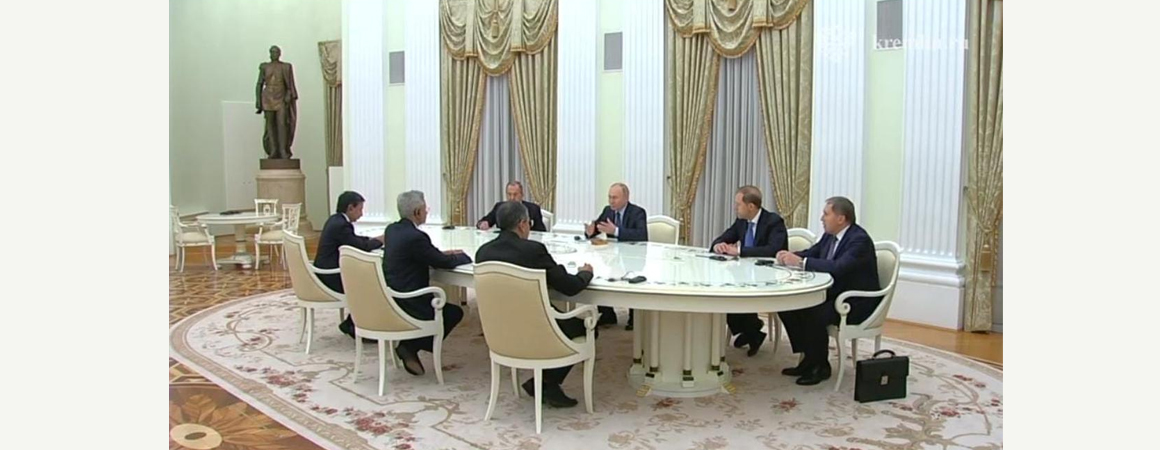India, Russia sign agreements on trade, connectivity, energy, military cooperation, including future collaboration on Kudankulam nuclear power plant; no mention of progress on rupee-rouble payment mechanism
Hailing India and Russia relations as “very steady” and “very strong”, External Affairs Minister S. Jaishankar said he was “confident” that the annual India-Russia leadership summit, that Prime Minister Narendra Modi and Russian President Vladimir Putin have skipped for two years, will be held in 2024, even as Mr. Putin extended an invitation to PM Modi to visit.
“We will be glad to see our friend, Mr. Prime Minister Modi in Russia,” Mr. Putin told Mr. Jaishankar during a meeting on Wednesday evening in Moscow, official news agencies reported, adding that the Russian President discussed the situation in Ukraine in some detail with the External Affairs Minister.
Mr. Jaishankar met with President Putin after a day of meetings with Foreign Minister Sergey Lavrov, and after holding Inter-governmental Commission (IR-IGC) talks with Russian Deputy Trade Minister Denis Manturov on Tuesday. He is travelling next to St Petersburg as part of a 5-day visit to Russia.
The meetings have yielded a number of agreements on trade, connectivity, nuclear energy, military technology, and arms supplies. More significantly, however, both sides say that the visit thus far has been marked by strong assertions on the importance of the bilateral relationship in a year where ties appeared to flag.
‘Ties not subject to politics’
“India-Russia relations remain very steady, remain very strong, they are based on our strategic convergence, on our geopolitical interests, and because they are mutually beneficial,” Mr. Jaishankar said, addressing the media after his talks with Mr. Lavrov. He emphasised the wide range of agreements the two sides have signed, including one that will further Russian collaboration on the Kudankulam nuclear power plant, and one renewing diplomatic consultation protocols for the period between 2024 and 2028.
“Our talks confirmed that relations between Moscow and New Delhi are one of trust, built on mutual respect and not subject to political fluctuations. They fully reflect the nature of our cooperation, as part of the special and privileged strategic partnership signed by the leaders of Russia and India,” Mr. Lavrov said, adding that they had agreed to deepen cooperation on the International North-South Transport Corridor that connects the two countries via Iran’s Bandar Abbas port, as well as the development of the Chennai-Vladivostok shipping route and the Polar Northern Sea routes.
Growing trade
Mr. Lavrov and Mr. Jaishankar also discussed a bilateral investment treaty, and plans to resume talks for the Eurasian Economic Union-India Free Trade Agreement in the “second half of January”. Trade between the two countries has crossed $50 billion in the past year, on the back of increased Indian imports of Russian oil and fertilizer in the wake of the war in Ukraine.
Mr. Jaishankar said that the trade was likely to increase this year, was “more balanced”, “sustainable, and provides for fair market access”. However, he did not mention any forward movement on resolving the rupee-rouble payment mechanism meant to circumvent the problems caused by Western sanctions on Russia. Speaking to the Indian community on Tuesday, Mr. Jaishankar had said that the governments were trying to “build trust” between their banks to facilitate the mechanism.
Annual summits
When asked whether the annual summit between the leaders, that was held without a break from 2000 to 2021, would be resumed, Mr. Jaishankar said that the leadership of both countries gave the highest-level mechanism “great importance”. He said that it would no doubt be held in 2024, explaining that it had been put off this year due to India’s other commitments with the G-20 Presidency.
He added that India hoped to host several governors from Russia’s Far East at the Vibrant Gujarat Global Summit to be inaugurated by Mr. Modi on January 10.
Changing global politics
Praising India for ensuring that the G-20 summit declaration was not “one-sided”, Mr. Lavrov lashed out at the United States and other G-7 countries for what he called the “distortion of the principles of international law and development of free markets”, referring to their sanctions against Russia, the freezing of Russian currency reserves, and the expulsion of Russia from international credit systems.
Claiming that the Global North was in decline, he said that the Global South and the East are “steadily increasing” their share of growth. “The trend will strengthen, including due to the expansion of BRICS,” Mr. Lavrov said, referring to this year’s doubling of the Brazil-Russia-India-China-South Africa grouping to include more emerging economies, including oil majors such as the United Arab Emirates and Saudi Arabia. Mr. Putin will host the first summit of the extended BRICS in 2024, which Mr. Modi is expected to attend.
Jaishankar, Lavrov hail “strong and steady” India-Russia ties; to resume annual summits in 2024
India, Russia sign agreements on trade, connectivity, energy, military cooperation, including future collaboration on Kudankulam nuclear power plant; no mention of progress on rupee-rouble payment mechanism
Hailing India and Russia relations as “very steady” and “very strong”, External Affairs Minister S. Jaishankar said he was “confident” that the annual India-Russia leadership summit, that Prime Minister Narendra Modi and Russian President Vladimir Putin have skipped for two years, will be held in 2024, even as Mr. Putin extended an invitation to PM Modi to visit.
“We will be glad to see our friend, Mr. Prime Minister Modi in Russia,” Mr. Putin told Mr. Jaishankar during a meeting on Wednesday evening in Moscow, official news agencies reported, adding that the Russian President discussed the situation in Ukraine in some detail with the External Affairs Minister.
Mr. Jaishankar met with President Putin after a day of meetings with Foreign Minister Sergey Lavrov, and after holding Inter-governmental Commission (IR-IGC) talks with Russian Deputy Trade Minister Denis Manturov on Tuesday. He is travelling next to St Petersburg as part of a 5-day visit to Russia.
The meetings have yielded a number of agreements on trade, connectivity, nuclear energy, military technology, and arms supplies. More significantly, however, both sides say that the visit thus far has been marked by strong assertions on the importance of the bilateral relationship in a year where ties appeared to flag.
‘Ties not subject to politics’
“India-Russia relations remain very steady, remain very strong, they are based on our strategic convergence, on our geopolitical interests, and because they are mutually beneficial,” Mr. Jaishankar said, addressing the media after his talks with Mr. Lavrov. He emphasised the wide range of agreements the two sides have signed, including one that will further Russian collaboration on the Kudankulam nuclear power plant, and one renewing diplomatic consultation protocols for the period between 2024 and 2028.
“Our talks confirmed that relations between Moscow and New Delhi are one of trust, built on mutual respect and not subject to political fluctuations. They fully reflect the nature of our cooperation, as part of the special and privileged strategic partnership signed by the leaders of Russia and India,” Mr. Lavrov said, adding that they had agreed to deepen cooperation on the International North-South Transport Corridor that connects the two countries via Iran’s Bandar Abbas port, as well as the development of the Chennai-Vladivostok shipping route and the Polar Northern Sea routes.
Growing trade
Mr. Lavrov and Mr. Jaishankar also discussed a bilateral investment treaty, and plans to resume talks for the Eurasian Economic Union-India Free Trade Agreement in the “second half of January”. Trade between the two countries has crossed $50 billion in the past year, on the back of increased Indian imports of Russian oil and fertilizer in the wake of the war in Ukraine.
Mr. Jaishankar said that the trade was likely to increase this year, was “more balanced”, “sustainable, and provides for fair market access”. However, he did not mention any forward movement on resolving the rupee-rouble payment mechanism meant to circumvent the problems caused by Western sanctions on Russia. Speaking to the Indian community on Tuesday, Mr. Jaishankar had said that the governments were trying to “build trust” between their banks to facilitate the mechanism.
Annual summits
When asked whether the annual summit between the leaders, that was held without a break from 2000 to 2021, would be resumed, Mr. Jaishankar said that the leadership of both countries gave the highest-level mechanism “great importance”. He said that it would no doubt be held in 2024, explaining that it had been put off this year due to India’s other commitments with the G-20 Presidency.
He added that India hoped to host several governors from Russia’s Far East at the Vibrant Gujarat Global Summit to be inaugurated by Mr. Modi on January 10.
Changing global politics
Praising India for ensuring that the G-20 summit declaration was not “one-sided”, Mr. Lavrov lashed out at the United States and other G-7 countries for what he called the “distortion of the principles of international law and development of free markets”, referring to their sanctions against Russia, the freezing of Russian currency reserves, and the expulsion of Russia from international credit systems.
Claiming that the Global North was in decline, he said that the Global South and the East are “steadily increasing” their share of growth. “The trend will strengthen, including due to the expansion of BRICS,” Mr. Lavrov said, referring to this year’s doubling of the Brazil-Russia-India-China-South Africa grouping to include more emerging economies, including oil majors such as the United Arab Emirates and Saudi Arabia. Mr. Putin will host the first summit of the extended BRICS in 2024, which Mr. Modi is expected to attend.






NO COMMENT